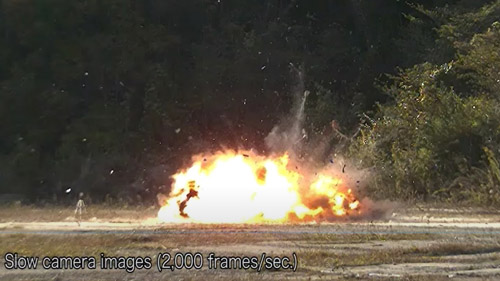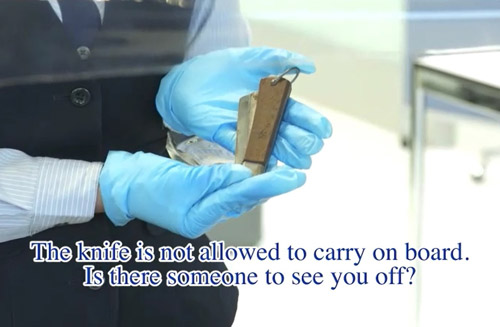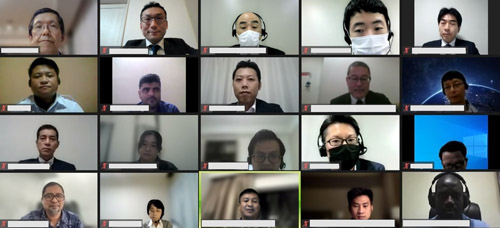[Report] Implementation of the 2021 KCCP program "Seminar on Aviation Security"
2022.03.28
With the terrorist attacks on September 11, 2001, in the United States, each country has strengthened aviation security measures such as anti-hijacking measures. Such aviation safety measures, which are implemented based on the international rules established by the International Civil Aviation Organization (ICAO), is effective when all the countries around the world implement the measures as set by the rules, thus the necessary support for developing countries should be emphasized.
JICA Yokohama has conducted a series of training programs in the field of aviation security for three years from 1986 to 1988 as the "Seminar on Aviation Management and Security", and from 1989 as the "Seminar on Aviation Security", for the officials in charge of aviation security policies in developing countries. With the cooperation of the relevant Japanese authorities, such as, Civil Aviation Bureau, which formulates policies on aviation security, and the relevant departments of the National Police Agency and the Metropolitan Police Department, the training program has provided with wide range of knowledge, skills, and updated information, such as countermeasures against hijacking and explosives.
The training program is held annual basis and recorded 36th in 2021. The number of the participants reached 501 from 90 countries and regions.
The 2021 training program was conducted in December following a 10-day online training curriculum. (Two participants from Cambodia, three from Laos, Maldives, Iran, and Burkina Faso (eight participants from five countries in total))
As was in the last year, this program was carried out online. Although there were problems with connecting to the Internet, the experts gave lectures on general aviation security measures such as on-site operations and practices from the policy and institutional aspects such as physical measures, aviation security administration in Japan, aviation security program, quality control program, education and training program, airport security screening, Security measures for air cargo, and measures against explosions. In addition, PowerPoint presentations from the participants, individual guidance to the participants, and exchange of opinions were smoothly carried out by utilizing the experience of the previous year.
Although the policy framework and methodology of aviation security have been strengthened since the start of training program in this field, its effectiveness depends largely on the continuation of daily operations in the field and the human capacity of each security personnel. Therefore, there is a high need for training program that focuses on improving skills, including practical aspects, such as this Program.
Unfortunately, we have not been able to provide the same opportunities for participants to acquire advanced and practical knowledge through direct instruction of training programs in Japan as we have in the past, under the COVID-19 pandemic. Furthermore, since the lectures were conducted online, there were more restrictions to deal with information that could be handled in the past. However, in order to acquire more practical knowledge, we have augmented the lectures by preparing video materials for this program since last year. The participants asked many questions about the contents of the video on security and disaster drills, including not only fire, but also bomb threats, cyber terrorism, hoaxes, and unlawful interference drills. This not only shows the high level of interest in the drills, but also the explicitness of the video is well received from the participants.

Explosives (Video Material Screenshot)

Security Inspection (Video Material Screenshot)
Instructors made every effort to improve the effectiveness of the training by encouraging participants to actively promote two-way communication with them. The participants asked many questions about the differences in Japan's crisis management measures compared to their own countries.
For some of the participants, it was the first time to have online discussions with overseas participants. However, during the program, there was a lively exchange of opinions and discussions among the participants about future issues in the field of aviation security in their countries.
There were many favorable comments from the participants of this program, such as "I can make proposals to improve the level of security measures at our airports based on what I learned in this course," and "It was good to gain a deeper understanding of a subject I had little knowledge of."

Group Photo at the Closing Ceremony
(Article produced in cooperation with Aviation Security Business Center)
The SDGs are a set of 17 individual goals and 169 more detailed criteria for achievement, which were set out in the outcome document entitled "Transforming Our World: The 2030 Agenda for Sustainable Development" adopted by the United Nations General Assembly in September 2015.
This program course was implemented to focus on Goal 9, "Build resilient infrastructure, promote inclusive and sustainable industrialization, and foster innovation" and Goal 16, "Promote peaceful and inclusive societies for sustainable development, provide access to justice for all, and build effective, responsible and inclusive institutions at all levels".
These are among the 17 goals set forth in the SDGs.
scroll